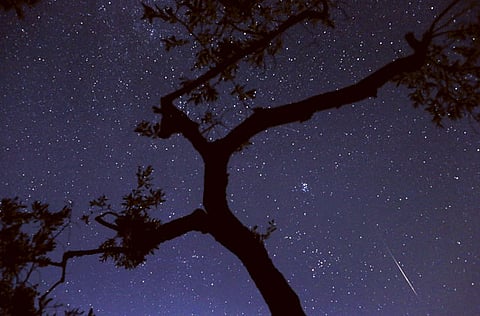Meteor shower to hit this Friday
Residents in the UAE can watch up to 100 meteors per hour entering the atmosphere at a speed between 12 to 72 kilometres per hour

Dubai: Stargazers in the UAE will be thrilled to know that the annual Perseid meteor shower expected to fall this weekend will be the most spectacular one yet.
The meteor shower will peak on August 12 and be visible to the naked eye.
Hassan Al Hariri, head of Dubai Astronomy Group, told Gulf News that there will be up to 100 meteors per hour, which will enter the atmosphere at a speed between 12 to 72 kilometres per hour.
“The meteor shower is the largest one this year and the sky will be dominated by fireballs, which will be spectacular,” said Hariri, who explained that the meteor shower can be seen from all corners of the country.
“To truly appreciate it, you will have to watch it in unlit areas that are away from the city’s lights.
"But the temperature at night is expected to reach 35 degrees Celsius, which is quite uncomfortable. As we are in the hot season, I would not recommend residents to go out,” he said.
However, if you are brave enough to face the heat, Hariri said that, “the best time to observe the meteor shower will be from 1-4am.”
According to the National Aeronautics and Space Administration (NASA), Earth may collide with three or more streams during the shower this year.
In a statement, NASA said that this year’s Perseid meteor shower could result in double the usual rate of meteors, and if you live in the Northern hemisphere, you can see as many as 200 meteors per hour.
“Here's something to think about: The meteors you'll see this year are from comet flybys that occurred hundreds if not thousands of years ago," said Bill Cooke, who leads NASA's Meteoroid Environment Office in Huntsville, Alabama.
"And they've traveled billions of miles before their kamikaze run into Earth's atmosphere."
Sign up for the Daily Briefing
Get the latest news and updates straight to your inbox



